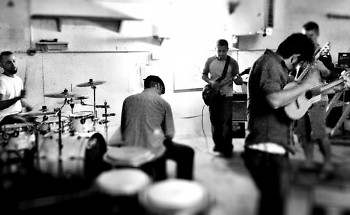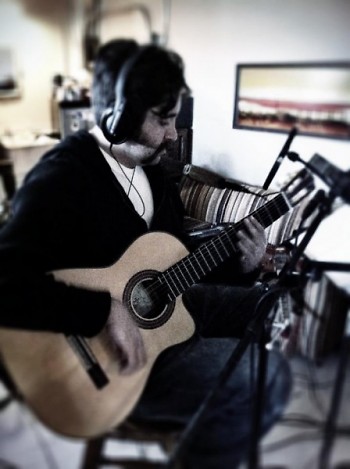Grand Rapids band Cabildo are certainly one of the unsung heroes of the Grand Rapids music scene. Over the last decade the band has been a reliable presence; playing its heavy latin-flavored and groove laden dance music at wide variety of venues. While the group hasn't received the recognition and accolades that maybe some of their peers and contemporaries have enjoyed; that suits the band just fine as you are just as likely see them perform ramshackle and anything goes improvised street performances with Artprize pianos as you would see them gracing the magnificent stage at Meijer Gardens.
Starting this weekend, remaining under the radar will not be an option, as the band gears up for a slate of high profile shows this June. First up is a 6:30 p.m. time slot at the Local First Street Party Saturday, June 1 outside of Bistro Bella Vista on Weston SW, followed by a plum 8:30 p.m. slot June 7 on the Calder Stage at the Festival of the Arts and then the victory lap at Founders Fest June 22 located on Grandville Avenue between Cherry and Bartlett.
I recently sat down with Cabildo multi-instrumentalist and vocalist Julio Villalobos (guitar, charango) and Percussionist Josh Dunigan (congas, percussion) to talk about the band’s storied history, their busy summer schedule of shows and the future. I return, I was treated to a delicious asparagus and cheese sandwich, kindly prepared by Villalobos, this famished citizen journalist was grateful.
Over the years the band has undergone a lot of the typical challenges that tear apart most bands including lineup changes and an extended hiatus. Hugo Claudin, Juan Daniel Castro and Jennifer Beahan are among the founding members of Cabildo whom Villalobos began playing with, however Villalobos is the only member of the original lineup that remains. Today the band finds themselves with a solidified core that includes Jonathan Barrera Mikulich (saxophone), Billy Chirco (trumpet), Dustin Miller (drums), Andrew Teggelaar (bass) and Julio Viveros (guitar) aka “Jarocho,” a name derived from the state of Veracruz in Mexico where Viveros originally is from.
The band is certainly greater than the sum of its parts and that is evidenced by the literal global range of influences each member bringsIt would be easy to describe the band’s sound as “Latin music,” but that is too general of a description for a sound that is far more complex, nuanced and as varied as the backgrounds of the members who comprise the group that is quite literally multicultural.
Dunigan describes hearing Cabildo for the first time.
“They played covers of South American pop music. They did Latino Oldies, the best Latin hits of the 80s and 90s,” he says laughing. Villalobos and Dunigan take turns throwing out styles to describe their sound –“Salsa,” “Meringue,” “a little funk,” “folk,” but both agree that Ska is at the core of their sound. It’s a subtle influence, but one that can be heard in their cover of the Specials “A Message to You, Rudy.”
Villalobos grew up in Patagonia, Chile and a teenager he started playing the classical guitar by taking lessons after school. At the time, in the late 1980s, Chile was under the dictatorship of General Augusto Pinochet. At 14, Villalobos began touring the country playing “folk music” that was government sponsored and under a strict censorship. Throughout the 70s and 80s, artists and musicians tried to draw the attention to the struggles of the Chilean people under the dictatorship of Pinochet such as Phil Ochs organizing the Friends of Chile Benefit Concert in 1974 to the Clash’s “Washington Bullets” and U2's "Mothers of the Disappeared."
For Villalobos however, finding music by Chilean artists such as the folk singer and political activist Victor Jara, who was tortured and shot by “44 machine gun bullets,” was extremely difficult.
“The music was underground, forbidden,” he says. He goes on to explain how he would obtain very low-quality cassette tapes from other musicians, but it was all very secretive until the Pinochet regime came to an end in 1990. Villalobos came to Grand Rapids in 1997, eventually meeting Claudin and Castro and forming Cabildo.
Josh Dunigan also moved to Grand Rapids via Oklahoma. Dunigan studied percussion in college and began giving conga lessons at the Percussion Museum that used to be located at 14 Weston SW. With that rare combination of talent, skill, knowledge and an easy going nature, Dunigan was soon invited to join Cabildo. In addition to Cabildo, Dunigan also brings his considerable knowledge and love of percussion to the public as member of the WaZobia drum ensemble. The group offers many educational and cultural music presentations in and around Grand Rapids.
A “Riotous Gathering”
Bringing together all of these diverse elements and backgrounds is largely what stirs Cabildo's melting pot sound. When asked how living in the United States has influenced the sound of Cabildo, Villalobos explains that the band continues to soak in influences from everywhere but states that “we have looked back to our own roots and heritage."
“I believe it is okay for some people to spend their life working on preserving some aspect of culture for posterity, it's an important job...but cultures are in perpetual transformation, the product of lives [and] social forces interacting in many ways. For that I believe my approach to culture is to highlight that process. Culture is to be transformed: through music we could show the audience an aspect of this transformation,” Villalobos says.
A fine example of the way that Cabildo can take a traditional song and remake into their exclusive sound is the song called “Toro Mata” which translates to “Kill Bull.” Villalobos describes the song originating as Afro-Peruvian Folk, but also being a close relative to American Blues. The is propelled by a syncopated and insanely infectious beat that Dunigan says is a “Lando Rhythm” played on an instrument Villalobos introduced him to known as the “Cajon” or “the box” before erupting into a mischievously tempting horn line wrapped around a slightly in-the-red and hypnotic guitar riff. By the end it’s an intoxicating blend of wild abandon and spice: a dexterous and seamless combination of a recipe of influences that Cabildo has expertly melded into their own sound. Ultimately it’s just fun, as one translation of their name suggests – “a riotous gathering.”
Studio recordings of the band have been hard to come by, but that is about to change as the band has been recording with local producer Matt Ten Clay and has about five songs complete. Dunigan says the band is hoping to get the songs into the “hands of as many people as possible” by having copies available of the songs at upcoming shows. The band hopes to have a full length album finished by the fall.
If you haven’t had the opportunity to see this local treasure of a band live, now is the time. There is not another band in Grand Rapids like Cabildo- a one of a kind band that distill a wide array of global influences into something that is entirely our own.
The Rapidian, a program of the 501(c)3 nonprofit Community Media Center, relies on the community’s support to help cover the cost of training reporters and publishing content.
We need your help.
If each of our readers and content creators who values this community platform help support its creation and maintenance, The Rapidian can continue to educate and facilitate a conversation around issues for years to come.
Please support The Rapidian and make a contribution today.



